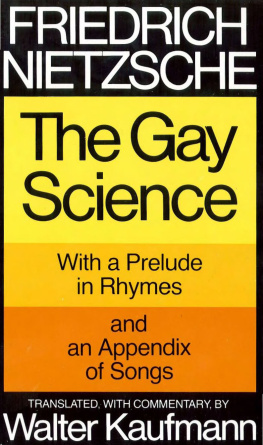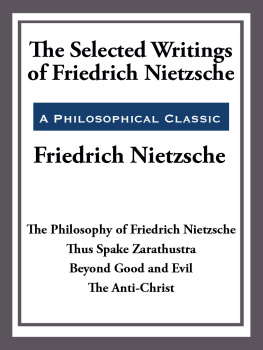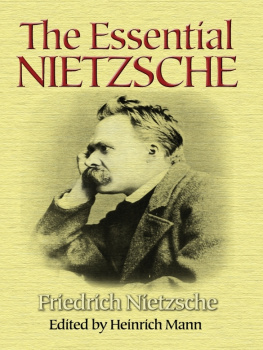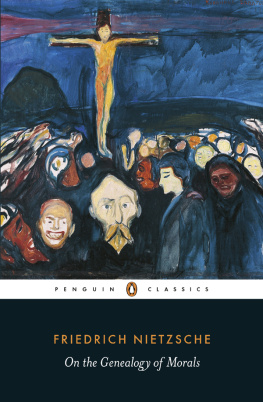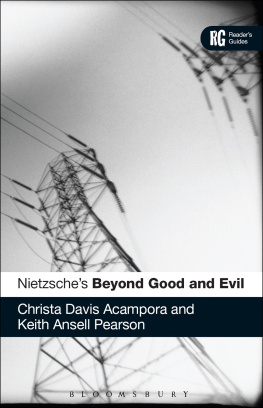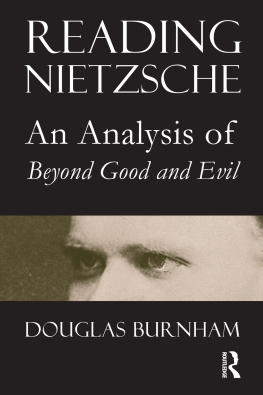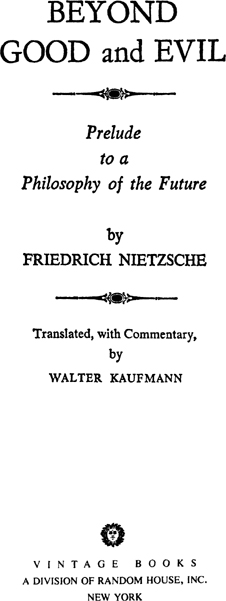CONTENTS

Translators Preface
Nietzsche was controversial to the marrow. He sought controversy and is still controversial But the area of agreement about him is growing. What the Germans and the French have known for some time is gradually being recognized in the English-speaking world as well: Nietzsche was one of the greatest German writers and philosophers of all time and one of the most interesting and influential Europeans of the nineteenth century. Beyond Good and Evil is one of his most important books, and its nine parts with their descriptive subtitles are designed to give the reader a comprehensive idea of Nietzsches thought and style.
For all that, the book, like all of Nietzsches best volumes, is easily misunderstood. For readers who come to it with no previous knowledge of Nietzsche or with erroneous preconceptions about him, I have ventured to offer something of a commentary in the form of copious footnotes. All of the footnotes are mine; none are Nietzsches.
I have chosen to use notes for elucidation of major and minor points in the text rather than a long introduction or interlarded commentaries because such notes can provide immediate clarification or interpretation for the reader who requires such assistance. On the other hand, the reader can skip the notes if he wishes, and read Nietzsche straight through without the intrusion of the editors commentaries.
Another possibility would have been to offer the commentary on facing pages, as I myself have done in the case of Hegels long Preface to the Phenomenology. But Nietzsches book is not that difficult: one can read it like an ordinary book, and many pages re-quire no elucidation. Everything considered, then, it seemed best to offer the commentary in the form of notesnone on some pages, several on others.
To keep down the length of the commentary and to avoid excessive repetition of material available elsewhere, I have referred to detailed discussion of many points in my own Nietzsche volume.
2
A word about the text: it was originally published in 1886, following Thus Spoke Zarathustra, which is generally and rightly regarded as Nietzsches first attempt to present his whole philosophy. All of his previous works had been stages in his development: with Zarathustra the final phase begins; a comprehensive vision has been attained but is far from easy to communicate. Zarathustra, though much of the work consists of apparently direct preaching, is a form of indirect communication, to use Kierkegaards term: the form is literary and there is an abundance of symbolism. For those who know the author well, the book is a-stunning epitome of his thought; for those who do not, some other approach is needed. It was with this in mind that Nietzsche wrote Beyond Good and Evil. And on September 22, 1886, he wrote Jacob Burckhardt: Please read this book (although it says the same things as my Zarathustra, but differently, very differently).
The first edition was the only one that Nietzsche himself supervised. In a letter to his friend Franz Overbeck, he wrote: I am making the experiment of having something published at my expense: assuming 300 copies will be sold, my expenses will be covered and I might be able to repeat the experiment some time. The firm of C. G. Naumann permits the use of its highly respectable name. This between us. The neglect by Schm.
The book of which Nietzsche had hoped to sell 300 copies was Beyond Good and Evil, but a year later, June 8, 1887, he writes Peter Gast: This time, for Bey. G. & E., everything necessary (and even a little more than that) has been done as far as the book trade is concerned: so Herr Schmeitzner cannot be blamed any more, as I had done so far. In spite of all this the result is the same as with Schmeitzner: rather, it is still worse! Altogether only 114 copies have been sold (while 66 copies have been given away to newspapers and journals).
Instructive! Namely, one simply does not want my literature; and Imay no longer afford the luxury of print.
By 1903,17,000 copies were in print; by 1906, 36,000. Since then new editions and translations into other languages have mushroomed.
The first edition has become a great rarity and has never been reprinted exactly as published in 1886. All subsequent editions contain a few very minor deviations. Karl Schlechtas edition of Nietzsches works in three volumes This translation follows the first edition. In my footnote commentary, deviations of the later editions are pointed out
I have taken two liberties. Nietzsche occasionally uses dots, usually four, as a punctuation mark; for example, but by no means there alone, at the end of sections 62 and 227. In serious works in the English-speaking world dots are so generally taken to indicate omissions that it did not seem advisable to follow Nietzsches usage. Dashes have therefore been used instead. Moreover, Nietzsche often employs dots or dashes in the middle of lengthy paragraphs. In such cases I have often begun a new paragraph to mark the break; and beyond that, I have generally broken up long paragraphs. The reader may always assume that in the original a numbered section constitutes a single paragraph; even if it is as long as the whole Preface or sections 25, 26, and 28.
3
Beyond Good and Evil has been translated into English twice before. The first translator, Helen Zimmern, was an English writer who had met Nietzsche in Site Maria in the summer of 1886the period when the book was completed, printed, and published. Indeed, Nietzsche mentions her in the margin of the letter to Franz Overbeck previously cited: Till the middle of September I shall stay here. There is no dearth of old acquaintances . Miss Helen Zimmern
In the index of names at the end of Nietzsches Briefe an Peter Gast, Helen Zimmern is identified as an English writer; in the index to Briefe an Mutter und Schwester (letters to mother and sister, Leipzig, 1909), as engl. Litteratin, which is less respectful. Neither volume mentions that she translated Beyond Good and Evil What Nietzsche wrote (September 19, 1886) about her to his
Helen Zimmern (18461934), two years Nietzsches junior, had published Arthur Schopenhauer: His Life and His Philosophy (1876) and Gotthold Ephraim Lessing: His life and His Works (1878); she also published many other books and translations, including several from the Italian. About her version of Beyond Good and Evil, Dr. Oscar Levy reported in 1913 in a short essay on The Nietzsche Movement in England (in the last volume, the eighteenth, of his edition of The Complete Works): But in 1907 the party had somewhat recovered its spirit, and as a last experiment brought out a translation of Beyond Good and Evilthis time at private risk, for no publisher could be induced to take up an author twice repudiated. This translation was one which had been made nearly ten years ago, but until then had never seen, and was never expected to see, the light of publicity. It turned out to be a successa half-hearted success perhaps, but one that at last told the few inmates of the Nietzschean ark that the waters of democracy had diminished, and that at least some higher peaks of humanity were free from the appalling deluge. The success encouraged them once more to take up their old project of the publication of the complete works






